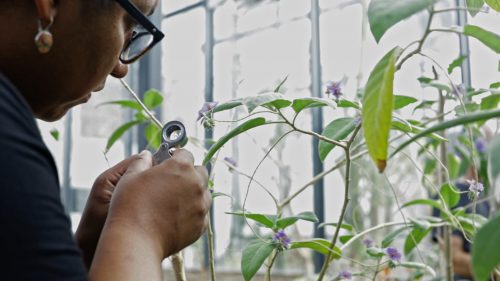
The Center for Maine Contemporary Art in Rockland will present “Erin Johnson: Unnamed for Decades,” a solo exhibition of new work by the artist this summer. Originally scheduled for March 21 through June 14, the exhibition has been rescheduled due to COVID-19.
Johnson is the recipient of the second annual Ellis-Beauregard Foundation Fellowship Award, which grants $25,000 to a Maine artist working in the visual arts and is paired with a solo exhibition at CMCA.
Johnson’s research-driven video installations blend documentary, experimental and narrative filmmaking devices to examine the ways in which individual lives and sociopolitical realities merge. Comprised of footage of site-specific performances, the videos explore how power structures are communicated through relationships, focusing on histories of nationalism and place.
“Unnamed for Decades” is the artist’s first solo museum exhibition in Maine. Spanning two galleries, the exhibition presents a series of new site-specific installations that incorporate videos, sculptures and photographs. These works explore the artist’s ongoing interest in the complexity of collectivity, the wide-ranging consequences of scientific research, as well as dissidence, desire and the queer body.
The title of the exhibition is drawn from a text about Solanum plastisexum, an Australian bush tomato whose sexual expression has confounded scientists and appears to be unpredictable and unstable, challenging even the fluid norms of the plant kingdom. This enigmatic plant is central to “There are things in this world that have yet to be named,” a video filmed in Bucknell University’s Solanum plastisexum lab and Los Angeles’s Huntington Botanical Garden. The voice-over is an amalgamation of texts, including love letters between conservationist Rachel Carson and her Southport Island neighbor Dorothy Freeman, and interviews with botanist Tanisha Williams. In an adjacent series of photographs and video installations, a group of friends, peers and lovers engage in collective queer and desirous exchanges, such as eating tomatoes in a field and floating together in a lake.
Reflecting on feminist theorist Silvia Federici’s call to “reconnect what capitalism has divided: our relation with nature, with others, and our bodies,” the exhibition considers questions surrounding the interrelationship between scientific and political practices, the reinvention of what it means to be human, and the climate crisis.
CMCA is temporarily closed to the public due to COVID-19, with a planned reopening of July 1, subject to change. See cmcanow.org for more information.
Categories: Rockland

